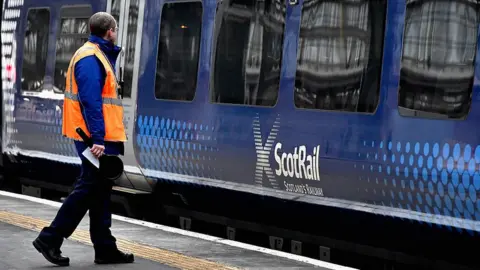Train strike to go ahead after ScotRail pay offer rejected
 Getty Images
Getty ImagesStrike action by ScotRail workers will take place on Monday 10 October after the RMT union rejected the latest pay offer.
There will be no services between Glasgow and Edinburgh and just a handful on three central belt routes.
An improved pay offer was made on Tuesday but the details of that were not made public.
The RMT union confirmed on Thursday afternoon that it would not be recommending members accept it.
ScotRail said only three services would be running during the day on Monday. They include;
- Milngavie to Edinburgh - two trains per hour
- Glasgow to Lanark - one train per hour
- Glasgow to Larkhall - one train per hour
Next week's strike is part of a wave of industrial action on the railways across the UK.
One involves a dispute by Network Rail staff who maintain the infrastructure, such as tracks and signalling.
They are unhappy about the future of jobs, as well as pay and conditions, and are due to walk out on Saturday, 8 October.
ScotRail is expect to run a limited daytime service on a number of routes around the Central Belt and the Borders including trains every 30 minutes between Glasgow and Edinburgh.


Rail passengers in Scotland have had a miserable summer.
First ScotRail had to run a reduced timetable for several weeks as drivers were declining overtime because of a pay row.
Then national strike action at the signals company Network Rail meant ScotRail had to cancel most of its services.
But so far there has been no strikes or formal industrial action at ScotRail itself.
ScotRail was effectively renationalised in April - it is owned by the Scottish government.
Any pay offer at the company has to be seen as value for money to the taxpayer and can be seen as a precedent for those public sector workers whose wages are directly paid for by taxpayer.
Improving on the pay offer to the RMT could prove difficult in practice.
The 5% offer rejected by the union was accepted by the drivers' union ASLEF. Revisions and improvements to that offer earlier this week were insufficient for the RMT which is worried about how its members are being affected by the rising cost of living.
The six months since ScotRail was brought back into public ownership have proved difficult for the company and its customers, even if the problems can be blamed on the impact of rising inflation and the cost-of-living crisis
It has hardly been the bright new dawn for the railways which supporters of renationalisation had hoped for.
